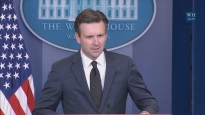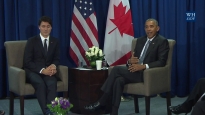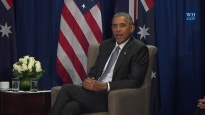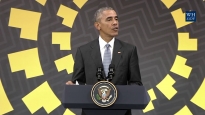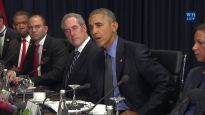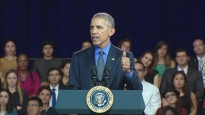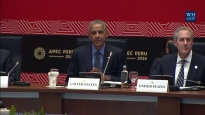Your Interview with the President
February 01, 2010 | 35:46 | Public Domain
President Obama sits down with YouTube’s Steve Grove to answer questions on a wide range from issues submitted from and voted on by YouTube users.
Interview of the President by YouTube
WITH STATE OF THE UNION Q&A
1:45 P.M. EST
MR. GROVE: Hello, everyone. We're here at the White House today for a very unique event -- an exclusive interview with President Obama in which the questions come from American people who have submitted them and chosen them online. My name is Steve Grove and I'm the news and politics at YouTube.
Mr. President, thank you for taking the time to answer these questions today.
THE PRESIDENT: It's my pleasure. Thank you, Steve. Thanks for having me and thanks to YouTube for doing this. We had a chance to do this before I was elected and had a great time, so I'm glad we can do it again.
MR. GROVE: Great. Well, let's tell people a little bit about how this works. Five days ago as you were delivering your State of the Union address, we opened up our moderator platform on YouTube, where thousands of people have been submitting and voting on both video and text questions. Some of them, as you'll see, were hard-hitting; others were emotional; some were even funny -- but all of the questions you'll see here today were voted into the top tier of the thousands of questions we received. And none of them have been chosen by the White House or seen by the President. So this should be a lot of fun.
Mr. President, let's let laymanmarcus from Silver Spring, Maryland, kick us off. He submitted this video to remind us of where things were a year ago.
(A video is shown.)
Mr. Marcus writes: "Mr. President, I know there have been political setbacks to getting health care reform done. The 40 million people who have no insurance can't wait. Will they be able to get insurance this year?"
THE PRESIDENT: It is my greatest hope that we can get this done not just a year from now, but soon. We came extremely close. We now have a bill that's come out from the House, come out from the Senate. That's unprecedented. And if you look at the core components of that legislation, what you have is 30 million people who get coverage, insurance reform so that people who have health insurance are going to be able to be protected from not being able to get it because of preexisting conditions or suddenly losing their health care because the insurance company has some fine print that they didn't read. It makes sure that we actually start bending the cost curve, controlling the rise in premiums, by instituting better practices in terms of how we reimburse doctors and how we ask hospitals to work together. We've already invested in electronic IT, electronic medical records, things that can help make the system more efficient.
So we had this enormous opportunity, but the way the rules work in the United States Senate, you've got to have 60 votes for everything. After the special election in Massachusetts, we now only have 59. We are calling on our Republican colleagues to get behind a serious health reform bill, one that actually provides not only the insurance reforms for people who do have health insurance but also the coverage for folks who don't.
My hope is, is that they accept that invitation and that they work with us together over the next several weeks to get it done.
MR. GROVE: A lot of people that submitted questions were sort of frustrated with the process of all of health care, and the number one question we got in health care came from Mr. Anderson in Texas who asked: "Why are the health care meetings and procedures not on C-SPAN as promised?" And then one of the top questions in the government reform category was Warren Hunter in Brooklyn, who said: "How do you expect people in this country to trust you when you've repeatedly broken promises that were made on the campaign trail, most recently the promise to have a transparent health care debate?"
THE PRESIDENT: Well, I guess, first of all, I would say that we have been certified by independent groups as the most transparent White House in history. It's important to understand. We are the first White House since the founding of the republic to list every visitor that comes into the White House online so that you can look it up. People know more about the inner workings of this White House, the meetings we have. We've excluded lobbyists from boards and commissions, but we also report on any lobbyist who meets with anybody who's part of our -- part of our administration.
So we've actually followed through on a lot of the commitments that we'd made. And so Warren is mistaken in terms of how he characterized it.
What is fair to say is that as the health care process went forward, not every single aspect of it was on C-SPAN. Now, keep in mind, most of the action was in Congress, so every committee hearing that was taking place, both in the House and the Senate, those were all widely televised. The only ones that were not were meetings that I had with some of the legislative leadership trying to get a sense from them in terms of what it was that they were trying to do.
I think it is a fair criticism. I've acknowledged that. And that's why as we move forward making sure that in this last leg, these five yards before we get to the goal line, that everybody understands exactly what's going on in the health care bill, that there are no surprised, no secrets. That's going to be an imperative. It's going to be one of my highest priorities.
MR. GROVE: Well, the central focus of your State of the Union was obviously jobs. And a lot of people wrote in asking for some clarity around some of your plans for small businesses. I'm going to play you two video questions in a row.
Q "Good evening, President Obama. One year ago today my wife and I were both let go from our jobs in corporate America within 48 hours of each other. We've since started a small business and we employ a couple people around us. What is being done to free up funding and encourage the growth of other small businesses that have such a tremendous impact on our economy? Thank you."
Q "Colin Callahan, Costa Mesa, California. Mr. President, how exactly are you planning on helping small businesses grow and prosper, besides simply providing tax breaks?"
THE PRESIDENT: Well, let me start with some specific issues that confront every small business all across the country, and it's absolutely true that if we can get small businesses back on their feet then that's going to go a long way towards bringing the unemployment rate down because that's the fastest generator of jobs across the country.
Number one, small businesses really are still struggling with financing. You hear stories everywhere you go that even profitable, successful businesses are having trouble getting financing because banks, frankly, just don't want to take the risk. After having taken way too many risks before, now they're taking no risk. And small businesses are punished for that.
So we've expanded the SBA loan -- the Small Business Administration loan portfolio by about 70 percent. We've been waiving guarantees and fees, trying to streamline the process, just to get more capital into the hands of small businesses. That's point number one.
Point number two then are the tax breaks that were alluded to. It is important to see if we can give more incentives to small business. So, for example, we're just eliminating capital gains for small business -- which is particularly important if you've got a start-up; 10 years from now you may end up being successful with your small business but suddenly you've got to pay taxes on it. If you can take that money and, instead of paying Uncle Sam, reinvest it in your business, you can grow it further. So we think that that's the kind of strategy that makes a lot of sense.
We want to also make sure that we're providing tax credits for hiring of small business -- small businesses that are hiring new employees. And so we've got a whole range of proposals there.
Now, in addition to the tax credits, in addition to the financing, one of the other things that, frankly, small businesses need is just a economic environment that is growing. And one of the things we're very proud of is the fact that we had a 6 percent contraction of the economy at the beginning of last year -- this past quarter we had a 6 percent increase in the growth of the economy. That 12 percent swing offers greater opportunities for small businesses to prosper and thrive.
The last point I'd make: One of the biggest burdens on small businesses is health care costs. And probably nobody benefits more from our health care proposals than small businesses, because what we're doing is we're saying that not only will you get tax credits to buy health insurance, but we're also going to let you pool -- buy into a big exchange so that you have the same purchasing power as a big company like Ford or Google is able to negotiate with insurance companies and get a good deal, well, now small businesses, by pooling together in this exchange, are going to have that same leverage. That will help lower their costs.
And for a lot of small businesses, it's not just a matter of giving health insurance to your employees; it's also just being able to buy health insurance for yourself. That will cut down on small businesses' costs and they'll be able to, again, invest more in their business.
MR. GROVE: A lot of Americans saw what happened on Wall Street this past year, and they wrote in saying, when are we going to get our bailout? Here is Frederick from Florida, who submitted the number one video question in the financial reform category.
Q "Mr. President, my name is Frederick from South Florida. I have a question about your HAMP program and why the banks are reluctant to modify loans for homeowners who can afford to stay in their homes. Now, the taxpayers bailed them out. They refuse to help us out. And I would like to know what say you, Mr. President?"
THE PRESIDENT: Well, look, this is something that we've been dealing with since the beginning of this financial crisis. We set up a program for loan modification that so far about
4 million people have taken advantage of across the country. You've got about 800,000 people who've gotten loan modifications that are saving them an average of $550. And so these are not insignificant savings. We've been able to get that done.
The problem is, is the number of people whose mortgages are underwater where they actually have a home value that's now less than their mortgage is a lot bigger than that. And you saw declining values all across the country.
So the amount of money that we've been able to get into this program has not met the entire need. We're now pushing the banks as hard as we can to make sure that not only do they do the most with the resources that we've been giving them, but that they also do a much better job of customer service with people who are coming to them. I get letters all the time of people who've gone through all kinds of hoops, filled out forms; the bank doesn't call them back, or after they've gone through a trial period, the bank says, well, we now think we shouldn't give you a home modification.
What we're trying to do is to increase transparency and force all the banks to tell us exactly what are you doing with your customers who want to stay in their homes, can't afford to pay a mortgage, but need something a little bit more limited.
And I'm hopeful that we're going to continue to see more and more people take advantage of it. But I want to be honest, given the magnitude of the housing problem out there, that there are still going to be pockets of areas where the housing values have dropped so much that it is still going to be tough for a lot of people, and we're just going to have to work our way through this as the economy improves.
MR. GROVE: Mr. President, let's lighten things up for a minute. We got a lot of people just submitting their ideas to you -- ideas for how to make the country better. They wanted to hear what you thought about them.
Let's play sort of a faster round of a thing we'll call "Good idea, bad idea." I'll show you an idea. You say whether you think it's good or bad, and maybe just a few sentences about what you think about it.
First one comes from Aloha Tony, your home state of Hawaii. He says, "Mr. President, our deficit is higher than ever at $12 trillion. Will you consider allowing the private sector to buy and take over the most troubled government-run agencies such as the U.S. Postal Service?"
THE PRESIDENT: Bad idea most of the time. There are examples where privatization makes sense, where people can do things much more efficiently. But oftentimes what you see is companies want to buy those parts of a government-run op that are profitable, and they don't want to do anything else.
So, for example, the U.S. Postal Service, everybody would love to have that high-end part of the business that FedEx and UPS are already in, business to business you make a lot of money. But do they want to deliver that postcard to a remote area somewhere in rural America that is a money loser? Well, the U.S. Post Office provides universal service. Those companies would not want to provide universal service. So you've got to make sure that you look carefully at what privatization proposals are out there.
MR. GROVE: So bad idea most of the time?
THE PRESIDENT: Most of the time.
MR. GROVE: Most of the time. Next idea is a video.
Q "My car insurance company will allow me to take driver's ed classes to reduce my monthly premiums. Could we do the same thing for health insurance -- take class in cooking, nutrition, stress management, communication, parenting, stopping smoking, maybe even exercise classes -- and get a reduction on our monthly premiums?"
THE PRESIDENT: Well, I think the idea is a good one, and that is that if people are being healthy, that they should be able to get some incentives for that. And a lot of companies are starting to do that. We probably don't want the insurance companies, though, making those decisions because insurance companies have every incentive to take the youngest, healthiest people and insure them, since they're less likely to pay out, and then leave older, sicker individuals out of their insurance pools. So it's important in any health care program to make sure that the young and the healthy and the older and the sicker are in a single pool.
But what we should encourage are individual companies who provide incentives for wellness programs, smoking cessation programs, they're going to get a workout once in a while -- those things are something we should encourage. And the First Lady, Michelle Obama, she's really focusing right now on childhood wellness, healthy eating, getting exercise. That's a campaign that she is going to be pushing all year long.
MR. GROVE: Let's get one more idea in here. This next one comes from JLevers in Dover, Delaware, who writes: "Do you think it would be worth looking at placing solar panels in all federal, state, and school buildings as a way to cut energy costs and put that budget money to better use?"
THE PRESIDENT: Good idea. And we want to do everything we can to encourage clean energy. And I have instructed the Department of Energy to make sure that our federal operations are employing the best possible clean energy technology, alternative energy technology. And what we're seeing is more and more companies realize this is a win-win for them. Not only is what they're doing environmentally sound, but it also over the long term saves money for them.
MR. GROVE: Great. Well, let's move back to the questions. And I got to tell you, the number one question that came in, in the jobs and economy category had to do with the Internet. And it came from James Earlywine in Indianapolis. He said: "An open Internet is a powerful engine for economic growth and new jobs. Letting large companies block and fill their online content services would stifle needed growth. What is your commitment to keeping Internet open and neutral in America?"
THE PRESIDENT: Well, I'm a big believer in net neutrality. I campaigned on this. I continue to be a strong supporter of it. My FCC Chairman, Julius Genachowski, has indicated that he shares the view that we've got to keep the Internet open; that we don't want to create a bunch of gateways that prevent somebody who doesn't have a lot of money but has a good idea from being able to start their next YouTube or their next Google on the Internet. So this is something we're committed to.
We're getting pushback, obviously, from some of the bigger carriers who would like to be able to charge more fees and extract more money from wealthier customers. But we think that runs counter to the whole spirit of openness that has made the Internet such a powerful engine for not only economic growth, but also for the generation of ideas and creativity.
MR. GROVE: Well, to get good jobs I think many Americans realize they need a higher education, but college tuition costs are so high. Here is a video question from Saginaw, Michigan:
Q "Dear President Obama, as a college student who has 14 credits and three part-time jobs, I'm just wondering what are your plans for -- plans to lower college tuition costs? I know we're in a struggling economy right now, but any little bit that you can help would be appreciated. Thank you. God bless. Bye."
THE PRESIDENT: Well, John is right that college tuition costs are just crushing on a lot of folks. And this is something that I remember from my own experience, because Michelle and I, we had college loans we kept on paying off for a decade after we had graduated from law school.
We've already done a huge amount to increase Pell Grants, to help increase the accessibility of college loans and grants at the college level. But we want to do more. And so we've put forward an initiative that is being debated in Congress -- and we hope to get passed this year -- where if you have student loans, that you will not have to pay more than 10 percent of your income on those loans; that after 20 years they'll be forgiven; and if you've gone into public service, they'll be forgiven after 10 years. That would provide a huge amount of relief for people.
We still need to expand more the Pell Grant program and make it both accessible to more people and raise the amount of tuition.
In order to pay for this -- the best part of this is we can actually figure out how to pay for it, because right now you've got a lot of banks and financial service companies who are still middlemen in the federally guaranteed loan programs. And if we can cut those middlemen out, then you've got several billion dollars that you can invest in the programs that I just described.
This is something that I've made a top priority. I want us to once again have the highest college graduation rates of any country in the world by 2020. We can get that done. But this is legislation that needs to pass.
And the last point I would make, colleges and universities also, though, have to figure out how can they cut their costs, because even if we're putting more and more loans in, more and more money for loans, if the inflation in higher education keeps on skyrocketing, over time it's still going to gobble up all that extra money and we'll be right back where we started. So we've got to show more restraint at the college and university level in terms of ever-escalating costs.
MR. GROVE: Well, let's back up a bit just from the specifics of education policy and ask a more fundamental question, which comes from Sean in Ohio.
Q "Mr. President, what do you want public education to help students become? Should they be good workers? Innovative thinkers? Something else? As a math teacher, I want to know what you think it means to be an educated person."
THE PRESIDENT: Well, I think obviously there's a huge economic component to being well educated. We know that if you've got a college education, you are going to make multiples of what you would make as a high school graduate, much less a high school dropout over the course of a lifetime. But it's absolutely true that a high-quality education is not just a matter of being a good worker; it's also a matter of being a good citizen, it's also a matter of being able to think critically, evaluate the world around you, make sure that you can process all the information that's coming at us in a way that helps you make decisions about your own life but also helps you participate in the life of the country.
And I'm a big believer that the most important thing that a kid can learn in school is how to learn and how to think. If Malia and Sasha, my two daughters, are asking questions, know how to poke holes in an argument, know how to make an argument themselves, know how to evaluate a complicated bunch of data, then I figure that they're going to be okay regardless of the career path that they're in. And I think that that requires more than just rote learning -- although it certainly requires good habits and discipline in school -- it also requires that in the classroom they're getting the kind of creative teaching that's so important.
And that's why our administration has initiated something called Race to the Top, where my Secretary of Education, Arne Duncan, has helped to design a competition among states so that they can foster the kinds of excellence in learning everywhere. Not just in some schools, not just in some states, but in every school in every state. If states want money, we're going to reward excellence, and we will show them what has been proven to work in terms of encouraging the kind of critical thinking that all of our children need.
MR. GROVE: Mr. President, the number two category after jobs and economy that people submitted to was national security and foreign policy. And the number one question came from concernedconservative in Georgia, who asked about your plans for the war on terror. And then Sean from Pennsylvania followed it up with: "Dear President Obama, if we remove our troops from the war on terror, how will you continue to combat the threat of terrorism?"
THE PRESIDENT: Well, first of all, I think it's important to understand that we are at war against a very specific group -- al Qaeda and its extremist allies that have metastasized around the globe, that would attack us, attack our allies, attack bases and embassies around the world, and most sadly, attack innocent people regardless of their backgrounds, regardless of their religions. Al Qaeda is probably the biggest killer of innocent Muslims of any entity out there.
And so that is our target and that is our focus. Now, they employ terrorist tactics, but we need to be clear about who our target is.
And we have to fight them on all fronts. We have to fight them in very concrete ways in Afghanistan and along the border regions of Pakistan where they are still holed up. They have spread to places like Yemen and Somalia, and we are working internationally with partners to try to limit their scope of operations and dismantle them in those regions.
But we also have to battle them with ideas. We have to help work with the overwhelming majority of Muslims who reject senseless violence of this sort, and to work to provide different pathways and different alternatives for people expressing whatever policy differences that they may have. And I think we haven't done as good of a job on that front.
We have to project economically, working in country like a Yemen, that is extraordinarily poor, to make sure that young people there have opportunity. The same is true in a place like Pakistan.
So we want to use all of our national power to deal with the problem of these extremist organizations. But part of that does involve applications of military power. And that's why, although it is the hardest decision that a Commander-in-Chief can make to send our troops into battle, I thought it was very important to make sure that we had an additional 30,000 troops in Afghanistan to help train Afghan forces so that they can start providing more effective security for their own country in dealing with the Taliban, and ultimately allow us to remove our troops but still have a secure partner there that's not going to be able to use that region as a platform to attack the United States.
MR. GROVE: Well, another central issue in the war on terror now is Guantanamo, and a lot of users wrote in about this. Oh, actually, you know what, I think we're going to -- well, how about I come later -- I think that question is actually about Sudan, which you didn't actually address in your State of the Union, but it was actually the number one voted question, and it's a video from the EnoughProject here in D.C.
Q "President Obama, more than 3 million Darfuris fear returning home because of instability. Many fear that Sudan may be on the brink of war. What will you do to galvanize the international community to ensure that widespread violence does not occur in Sudan this year?"
THE PRESIDENT: Well, the situation in Sudan has been heartbreaking but also extremely difficult, and something that we started working on the day that I came into office. Our first task was, at that time, making sure that people who were in refugee camps in Darfur had access to basic water, food, other necessities of life. And this was after the Sudanese government in Khartoum had kicked out a whole bunch of nongovernmental organizations that were providing assistance there. We were able to get that assistance back in to help at least initially stabilize the situation.
The next step in the challenge is to broker a lasting peace agreement between rebels who are still in the Darfur region and this government. And I've got a special envoy who has been very active in trying to bring together the international community to get that deal brokered.
Part of what makes it complicated is you also have a conflict historically between northern Sudan and southern Sudan. They finally reached a agreement after a lot of work. But the Sudanese now -- the southern Sudanese now have an option where they may be seeking to secede from all of Sudan. That's another potential conflict that could create additional millions of refugees.
And so what we are doing is try to work with not only the regional powers but the United Nations and other countries that have shown a great interest in this to see if we can broker a series of agreements that would stabilize the country, and then allow the refugees who are in Darfur to start moving back to their historic lands.
Sadly, because of the genocide that took place earlier, a lot of those villages are now destroyed. And so thinking about how to resettle these populations in places that are viable economically, that have the resources to support populations, is a long-term development challenge that the international community is going to have to support.
We continue to put pressure on the Sudanese government. If they are not cooperative in these efforts, then it is going to be appropriate for us to conclude that engagement doesn't work, and we're going to have to apply additional pressure on Sudan in order to achieve our objectives. But my hope is, is that we can broker agreements with all the parties involved to deal with what has been enormous human tragedy in that region.
MR. GROVE: The question we missed from the deck, but it was about Guantanamo, and essentially he was just saying why is it taking so long to close down Guantanamo?
THE PRESIDENT: Well, it's pretty straightforward. Number one, you've got a whole bunch of individuals in Guantanamo, some of whom are very dangerous, some of whom were low-level fighters, some of whom the courts have determined should never have been put there in the first place. We've had to evaluate each of those cases, hundreds of cases, one by one, to determine what these various categories are, and do it in a way that stands up to our standards of due process and legal scrutiny.
Then we've got to figure out, if we're closing Guantanamo, where are we going to put them? And we have proposed that there are a number of options on the continental United States where you could hold these people as trials either in military commissions or in Article 3 courts are pending. But unfortunately, there has been a lot of political resistance, and, frankly, some of it just politically motivated -- some of it people being legitimately scared about, well, if we've got somebody who we've been told is a terrorist in our backyard, will that make us a target?
One of the things that we've had to try to communicate to the country at large is that, historically, we've tried a lot of terrorists in our courts; we have them in our federal prisons; they've never escaped. And these folks are no different. But it's been one of those things that's been subject to a lot of, in some cases, pretty rank politics.
And we've got to work through that process because Congress ultimately controls the purse strings in creating new facilities. If Congress makes a decision that they are going to try to block the opening of a new facility, it potentially constrains what our administration can do. And so this is something that we've got to work through both in Congress but also with public opinion so that people understand that ultimately this is the right thing to do. By closing Guantanamo, we can regain the moral high ground in the battle against these terrorist organizations.
There's been no bigger propaganda weapon for many of these extremists than pointing to Guantanamo and saying that we don't live up to our own ideals. And that's something that I strongly believe we have to resist, even if it has some costs to it, and even if it's not always the most politically popular thing to do.
MR. GROVE: Mr. President, we don't have much time left, but I want to make sure we get to the issue of energy, the environment. One of the rare moments where you were able to get applause from your friends on the Republican side of the aisle in Congress the other night was when you mentioned nuclear energy. And just today your budget announced tripling the loan guarantees for nuclear reactors. A lot of people had questions about just how this would work and why you did that.
Q "President Obama, record numbers of young people elected you in support of a clean energy future. If money is tight, why do you propose wasting billions in expensive nuclear, dirty coal, and offshore drilling? We need to ramp up efficiency, wind and solar, that are all economically sustainable and create clean and safe jobs for our generation."
THE PRESIDENT: Well, you're not going to get any argument from me about the need to create clean energy jobs. I think this is going to be the driver of our economy over the long term. And that's why we put in record amounts of money for solar and wind and biodiesel and all the other alternative clean energy sources that are out there.
In the meantime, though, unfortunately, no matter how fast we ramp up those energy sources, we're still going to have enormous energy needs that will be unmet by alternative energy.
And the question then is, where will that come from?
Nuclear energy has the advantage of not emitting greenhouse gases. For those who are concerned about climate change, we have to recognize that countries like Japan and France and others have been much more aggressive in their nuclear industry and much more successful in having that a larger part of their portfolio, without incident, without accidents. We're mindful of the concerns about storage, of spent fuel, and concerns about security, but we still think it's the right thing to do if we're serious about dealing with climate change.
With respect to clean coal technology, it is not possible at this point to completely eliminate coal from the menu of our energy options. And if we are ever going to deal with climate change in a serious way, where we know China and India are going to be greatly reliant on coal, we've got to start developing clean coal technologies that can sequester the harmful emissions, because otherwise -- countries like China and India are not going to stop using coal -- we'll still have those same problems but we won't have the technology to make sure that it doesn't harm the environment over the long term.
So I know that there's some skepticism about whether there is such a thing as clean coal technology. What is true is right now that we don't have all the technology to prevent greenhouse gas emissions from coal-fired power plants, but the technology is close and it makes sense for us to make that investment now, not only because it will be good for America but it will also ultimately be good internationally. We can license and export that technology in ways that help other countries use a better form of energy that's going to be helpful to the climate change issue.
MR. GROVE: Mr. President, I think we're out of time, but I know a lot of people really enjoyed the opportunity to ask questions of you in this way, and we'd love to do this again with you some time.
THE PRESIDENT: You know, this was terrific. And I just want to thank everybody who submitted questions, whether via e-mail or over the Internet. And I hope we get a chance to do this on a more regular basis, because it gives me great access to all the people out there with wonderful ideas. And even if you didn't make your question, even if it wasn't on this show, we appreciate your submission, and hopefully we'll catch you next time.
MR. GROVE: Great. Thanks, Mr. President.
THE PRESIDENT: All right, thank you, appreciate it.
END
2:24 P.M. EST
|
November 22, 2016
|
November 22, 2016
|
November 20, 2016
|
November 20, 2016
|
|
November 20, 2016
|
November 19, 2016
|
November 19, 2016
|
November 19, 2016
|
- &lsaquo previous
- …
- 6
- 7
- 8
- 9
- 10
- 11
- 12
- 13
- 14
- …
- next &rsaquo

